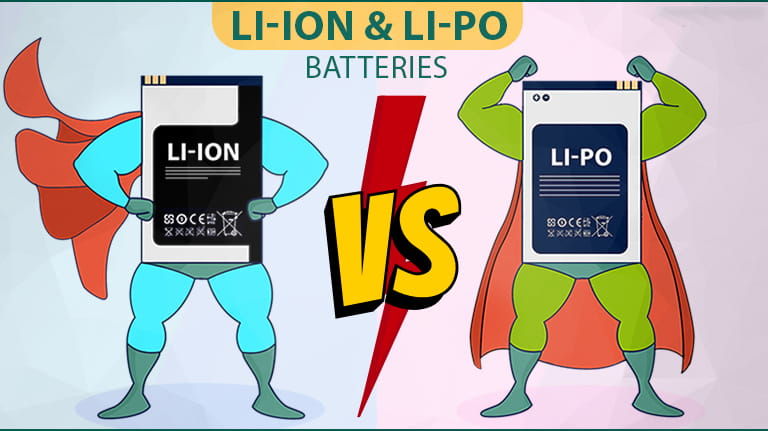Lifepo4 vs lithium-ion battery: What are the differences?
When deciding between a lithium-ion battery and a lifepo4 battery, it is essential to consider the differences between them to determine which one better suits your needs. Both offer advantages and disadvantages that can make them suitable for different applications. In this article, we will explore the key differences between lifepo4 and lithium-ion batteries so you can make an informed decision.

lifepo4 vs lithium-ion price
Lifepo4 batteries tend to be more expensive upfront than lithium-ion, but Lifepo4 batteries are more efficient and have a longer lifespan than lithium-ion batteries. They are also less prone to overheating or catching fire, which can help reduce your risk of costly damage from an accident or malfunction. So they are better value in the long run.
lifepo4 vs lithium-ion charging
Although lithium-ion batteries can hold a charge for an extended period and charge quickly, they might be vulnerable to overheating if not correctly maintained. Compared to lithium-ion batteries, LiFePO4 batteries charge more slowly, making them more suitable for uses that call for a slow, constant charge over a longer duration.
Additionally, Lifepo4 batteries can store more energy in a smaller area than lithium-ion batteries since they have a higher power density. They need a unique charger incompatible with other battery types, and they are heavier than their competitors. This could be an inconvenient factor if you need to charge several different kinds of batteries at once.
lifepo4 vs lithium-ion weight
On average, a lifepo4 battery will be about 30% lighter than a comparable lithium-ion battery. This makes them ideal for electric vehicles or portable electronics. Lithium-ion batteries have a higher energy density than LiFePO4 batteries, with 150/200 Wh/kg against 90/120 Wh/kg, respectively. LiFePO4 batteries, on the other hand, are thought to be safer and less volatile due to their lower cell density. And they are frequently stacked in parallel to increase the capacity of a LiFePO4 pack.
lifepo4 vs lithium-ion lifespan
Lithium-ion and LifePO4 batteries both have impressive lifespans. LifePO4 batteries have a cycle life of around 3000 cycles, which is equivalent to a period of more than seven years. Lithium-ion batteries have a storage capacity that is just as good. Still, their life shelf is about two years(probably the last 500-1,000 cycles). Despite having a shorter lifespan, lithium-ion batteries still provide close to the same performance for over one year.
lifepo4 vs lithium-ion energy-density
Lithium-ion and lifepo4 have high energy densities, with lifepo4 slightly greater than lithium-ion. Lithium-ion batteries have an energy density of 250-340 watts per kilogram, while LiFePO4 batteries have an energy density of 90-165 watts per kilogram.
lifepo4 vs lithium-ion for solar
When it comes to solar, LiFePO4, and lithium-ion batteries both offer many benefits. LiFePO4 batteries have the edge over lithium-ion primarily regarding cycle life, a lifespan of about 3000 cycles, and safety. The energy density of lithium-ion batteries is higher than that of LiFePO4 batteries. Still, when four LiFePO4 cells are connected in series, they provide a pack voltage of between 12.8 and 14.2 volts when fully charged. An essential benefit of LiFePO4 is that it does not require a deep discharge cycle, unlike other batteries.
Ultimately, both LiFePO4 and lithium-ion batteries offer efficient storage solutions for solar energy systems; however, the longer life cycle and safety features of LiFePO4 make it the preferred choice for solar applications.
lifepo4 vs lithium-ion power station
Regarding power stations, LiFePO4 and Lithium-ion are two popular options. LiFePO4 is a Cobalt-free battery with a lower energy density, making it heavier but with higher AH capacities. Compared to Lithium-ion, LiFePO4 has a lower energy density. It is 30% heavier and 40% bigger, making it a less ideal option for portability. However, LiFePO4 packs a punch regarding the high current rating, as four cells in a series can provide a voltage of 12.8-14.2 volts when complete. Furthermore, LiFePO4 is the more economical option in the long run due to its better value for money and a longer lifespan than lithium-ion batteries.
In conclusion
There is no single answer to the question of which battery type – LiFePO4 or lithium-ion – is superior. Different applications require different battery types, and it’s up to you to decide which best suits your needs. When selecting a battery, consider its cost, power capacity, charge cycle life expectancy, and other essential factors. Additionally, always consult us if you are unsure which type of battery is right for your application.








